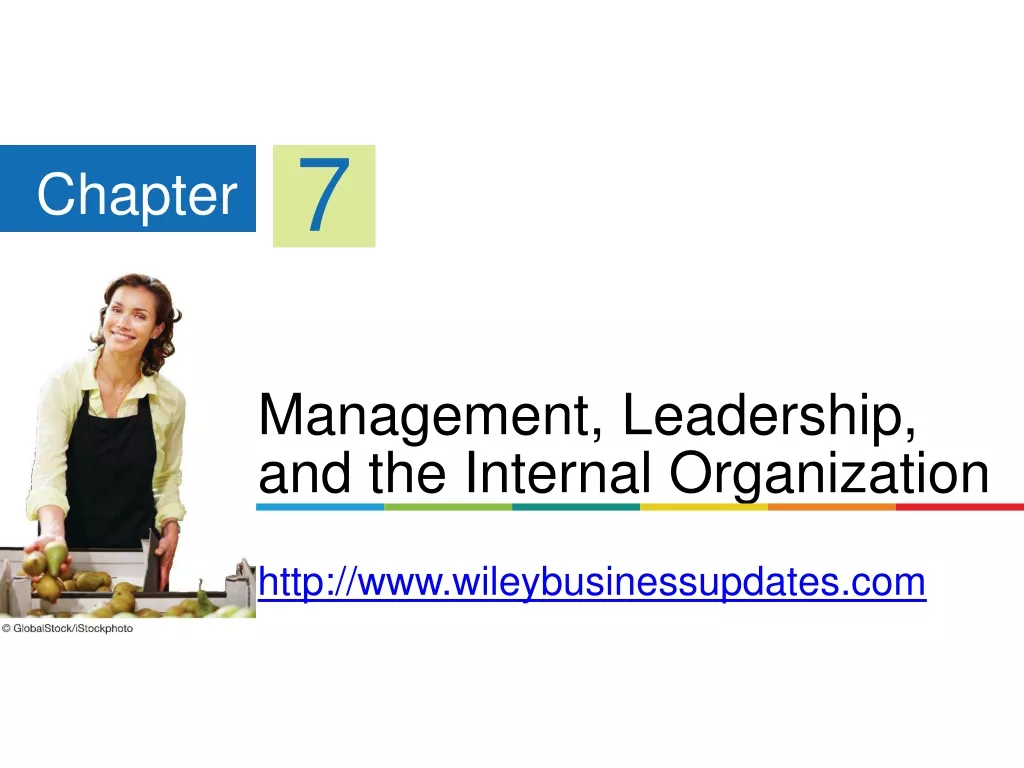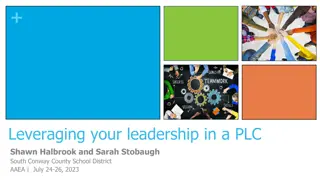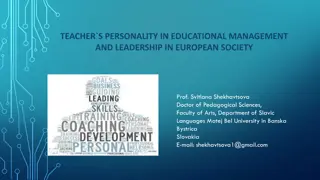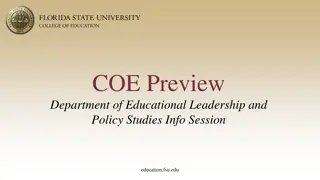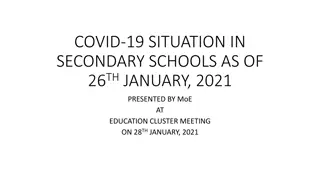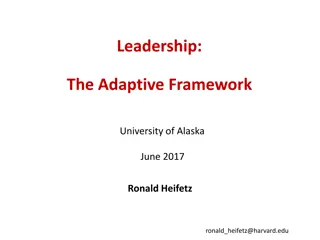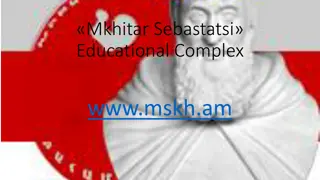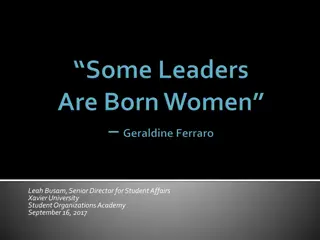Enhancing Educational Leadership and Management in Schools
Educational leadership and management processes play a crucial role in ensuring high-quality teaching and learning experiences. This involves attention to instructional leadership, effective use of educators through distributed leadership, and adherence to professional teaching standards. Challenges faced by school leaders include lack of targeted professional development, skewed appointment practices, and the need for practical training. Implementing policies effectively, streamlining programs, and fostering communication are key aspects highlighted in the responses from school leaders.
Download Presentation

Please find below an Image/Link to download the presentation.
The content on the website is provided AS IS for your information and personal use only. It may not be sold, licensed, or shared on other websites without obtaining consent from the author.If you encounter any issues during the download, it is possible that the publisher has removed the file from their server.
You are allowed to download the files provided on this website for personal or commercial use, subject to the condition that they are used lawfully. All files are the property of their respective owners.
The content on the website is provided AS IS for your information and personal use only. It may not be sold, licensed, or shared on other websites without obtaining consent from the author.
E N D
Presentation Transcript
EDUCATIONAL LEADERSHIP AND MANAGEMENT processes are required to ensure that teaching and learning are of high quality, whatever the context. This links to the growing attention to instructional leadership, and the effective use of all educators through distributed leadership (Xaba, 2012) 2 Professional Teaching Standards - DRAFT FOR CONSULTATION WITH TEACHERS & SUBJECT AND PHASE SPECIALISTS
EDUCATIONAL LEADERSHIP AND MANAGEMENT Background - Policy Framework NDP 2030 Chapter 9 IMPROVING EDUCATION, TRAINING AND INNOVATION ACTION PLAN 2024 Towards the Realization of Schooling 2030 Goal 21 basic annual management processes are taking place - Goal 18 ensure that all learners cover all topics and skills (curriculum coverage) - Legislation SASA, EEA, SACE, NEPA - Policy -CAPS, NPA, N4PR, CAPSCAM, SIAS, PAM (Chapter F) 3 Professional Teaching Standards - DRAFT FOR CONSULTATION WITH TEACHERS & SUBJECT AND PHASE SPECIALISTS
QUESTION 1 QUESTION RESPONSES How are school leaders experiencing leadership and management in schools? - Lack of targeted professional development - Middle management weakest link, - Need for practical ( not theoretical) training, - Appointment practices skewed, - principals don t share/cascade information, - DH/DP generally not allowed to attend to keep schools running. -Implementation of policy is key. Non-streamlining of programmes/policies - Curriculum changes first communicated to subject teachers through Whattsup, principals left behind generally. - 4 Professional Teaching Standards - DRAFT FOR CONSULTATION WITH TEACHERS & SUBJECT AND PHASE SPECIALISTS
QUESTION 2 QUESTION RESPONSES 1. In what ways is (a) instructional leadership and (b) distributive leadership enabled and/ or constrained by professional agency, autonomy and voice? - - SA Standards for School Principals Implement policy (circulars, memos, regulations, internal memos etc) develop staff communicate policy req to all Protection of instructional time ( C 1 of 2019) Effective Communication of established processes across staff and other stakeholders distribute various functional areas allowing others to lead. Establish alliances with teacher unions/develop capacity of the SGB Prioritize induction and mentoring Avoid blame syndrome Establish trust and among staff to be involved in the matters of school operations. - - - - - - 5 Professional Teaching Standards - DRAFT FOR CONSULTATION WITH TEACHERS & SUBJECT AND PHASE SPECIALISTS
QUESTION 3 QUESTION RESPONSES To what extent are school leaders developed and supported in the effective leadership and management of the school, including instructional and distributive leadership? - Departmental policies - Communication of decisions and programmes through circulars/memos/regulations - Workshops and meetings - District support 6 Professional Teaching Standards - DRAFT FOR CONSULTATION WITH TEACHERS & SUBJECT AND PHASE SPECIALISTS
QUESTION 4 QUESTION RESPONSES 1. To what extent are school leaders developed and supported in the effective leadership and management of the school, including instructional and distributive leadership? How can school leaders use their efficacy, leadership and agency to address these challenges? - Leaders/managers individual capital (personal traits, talents, strong self-will, creativity, enterprise available to each) Stay strong and fight for yourself - Self-sustenance. Not being listened to, when no one gets into your tight-fitting shoes Managing issues of sexuality and inclusivity (dynamics of leadership that lead to taking unpopular decisions even in policies and practices) Managing staff personal and family issues that impact on functionality esp t + learning. Change how you do things if it does not work Mind Power. - - - - - 7 Professional Teaching Standards - DRAFT FOR CONSULTATION WITH TEACHERS & SUBJECT AND PHASE SPECIALISTS
QUESTION 5 QUESTION RESPONSES 1. How can school leaders use their efficacy, leadership and agency to address these challenges? 1. What are the five key recommendations from the Educational Leadership and Management parallel session to plenary? - Continuous professional development of and by school leaders/managers (CPTD) self- cultivation Develop leadership individual capital Thorough induction and conntinous mentoring/coaching Capacity and integrity of elected SGB members Sharing of best practices. - - - - 8 Professional Teaching Standards - DRAFT FOR CONSULTATION WITH TEACHERS & SUBJECT AND PHASE SPECIALISTS


